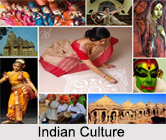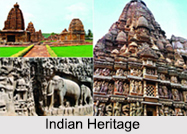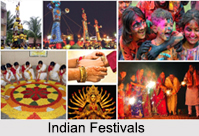 Indian Culture and traditions are something which has now become renowned all across the world. Indian Culture is very diverse and unique and has been interpreted in various ways. There are varied ideas that pass through one`s mind when Indian Culture is the subject to be spoken on. To some philosophical and spiritual beliefs are the bases of Indian Culture. Others say that dreams and ideals as embodied in the best architecture, the sculpture and paintings reflect Indian Culture. Some, on the other hand, point out the various symbolic representations of thought-forms like the concept of Nataraja or the Indian Music with its varied Ragas as the essence of Indian Culture. The South, East, West, North, Central and North-East have their own distinct cultures and almost every state has carved out its own cultural niche. There is hardly any culture in the world that is as varied and unique as India. India is a vast country, having variety of geographical features and climatic conditions. India is home to some of the most ancient civilizations, including four major world religions; Hinduism, Buddhism, Jainism and Sikhism.
Indian Culture and traditions are something which has now become renowned all across the world. Indian Culture is very diverse and unique and has been interpreted in various ways. There are varied ideas that pass through one`s mind when Indian Culture is the subject to be spoken on. To some philosophical and spiritual beliefs are the bases of Indian Culture. Others say that dreams and ideals as embodied in the best architecture, the sculpture and paintings reflect Indian Culture. Some, on the other hand, point out the various symbolic representations of thought-forms like the concept of Nataraja or the Indian Music with its varied Ragas as the essence of Indian Culture. The South, East, West, North, Central and North-East have their own distinct cultures and almost every state has carved out its own cultural niche. There is hardly any culture in the world that is as varied and unique as India. India is a vast country, having variety of geographical features and climatic conditions. India is home to some of the most ancient civilizations, including four major world religions; Hinduism, Buddhism, Jainism and Sikhism.
 History of Indian Culture
History of Indian Culture
The origin of Indian culture is the Vedic age which includes ancient treatises like,Upanishads, Ramayana and Mahabharata. The history of Indian Culture is deep rooted in the Indus Valley Civilization and the arrival of the Aryans. Both these phases are described as the pre-Vedic and Post Vedic periods respectively. It was during the Vedic period that Hinduism evolved. Then ushered in the Classical Age that began with Buddhism and ended with Harsha Vardhan. After this, the medieval age begins with the Rajput culture and ending with the Indo-Muslim culture. Thereafter comes the modern age. This age witnesses the Western influences on the Indian Culture and the beginning of the Indian Renaissance.
 Features of Indian Culture
Features of Indian Culture
Tolerance is one of the major features of Indian culture. All races have found their habitation in India but they have not been persecuted. Balance is also a marked characteristic of Indian Culture. It is also characterised by harmony. Ceaseless search after truth is another feature of Indian culture. Fundamentally, India has always possessed great unity and continuity of culture. India has found unity in religion and spirituality. All her art forms expressed the same truth. The Hindu custom of religious pilgrimages betokened the same consciousness of a common homeland. Fundamental unity of India was rooted in the psychology of the Indians. Politically also, the attempts at empire-building embracing the whole of India indicate the trend towards unity. Culturally there is a complex harmony of composites. Certain common ideas are practiced by the Indians from times immemorial.
The principles that guide the various stages of the Indian culture are psychological in character, are symbolical, typical, conventional, individualist and subjective. The symbolical was operating during the Vedic period, the typical in the age of Dharma, the conventional in the medieval period, the individualist in the modern and the subjective principle has just begun in the most recent epoch.
Influences on Indian Culture
In many ways the topography of India has affected the course of her history and culture. The spirit of tolerance has been nurtured and fostered by India"s geography. Diversity in landscape, climate and conditions of life prepared in the Indian minds a readiness to accept difference. The vast spaces offered room for slow infiltration by newcomers and allowed each locality scope for development along its own lines. Indian climate makes one feel lethargic. The fertility of the land and its agricultural economy explain the depth and tenacity of her culture. The geography of India explains the fundamental basis of Indian culture – unity amidst diversity.
 Racial factors are responsible for the shape the Indian culture has assumed through the course of centuries. Races after races have poured into India lent their original contribution and have been assimilated in the Indian locale. India has been called a museum of races. They have spread themselves in Assam, Chittagong Hills and Bhutan. The Mediterranean people are in Kannada, Tamil, Malayalam, Punjab, Gangetic Valley, Sindh, West Bengal, Odisha, Kathiawar, Coorg, Gujarat, Kashmir, Upper Ganges Valley and in Maharashtra among the Chitpawan Brahmans. Among these races some have led India in international trade. Their language forms a solid block in the Deccan and South India. The Dravidians have contributed the cult of Lord Shiva, the worship of Mother Goddess or Shakti and also the institution of Yoga. Aryans have given us through their philosophical, religious and spiritual ideas the original and fundamental basis of Indian culture.
Racial factors are responsible for the shape the Indian culture has assumed through the course of centuries. Races after races have poured into India lent their original contribution and have been assimilated in the Indian locale. India has been called a museum of races. They have spread themselves in Assam, Chittagong Hills and Bhutan. The Mediterranean people are in Kannada, Tamil, Malayalam, Punjab, Gangetic Valley, Sindh, West Bengal, Odisha, Kathiawar, Coorg, Gujarat, Kashmir, Upper Ganges Valley and in Maharashtra among the Chitpawan Brahmans. Among these races some have led India in international trade. Their language forms a solid block in the Deccan and South India. The Dravidians have contributed the cult of Lord Shiva, the worship of Mother Goddess or Shakti and also the institution of Yoga. Aryans have given us through their philosophical, religious and spiritual ideas the original and fundamental basis of Indian culture.
Indian cultural evolution, therefore, can be best understood in psychological terms. The core of Indian Culture has always been to be well mannered, polite, respect others and progress together.






































